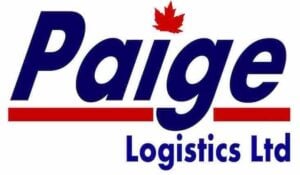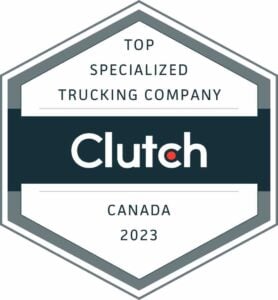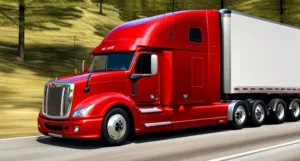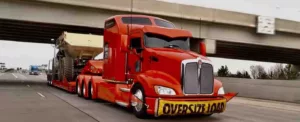Heavy Haul Trucking Services for
Canada & USA
Reliable Superload Trucking for Your Oversized Freight Needs Rated #1 in Canada
Paige Logistics Ltd. is Canada’s and USA’s heavy haul trucks expert. We transport supersize loads, mining equipment, and all heavy machinery. We carefully handle long, wide, tall, and extremely heavy goods.
Our seasoned logistics managers have the knowledge, abilities, and have the cutting-edge superload transport equipment to handle the toughest logistics challenges. Our heavy haul fleet is intended to carry even the largest of loads.
Paige Logistics is located in greater Vancouver, British Columbia, offering a wide range of heavy freight transportation services for even the most complex cargoes. Our big hauler trucking logistics services specialize on long, wide, tall, and extremely large goods that requires heavy machinery transport knowledge.
Due to our extensive network of heavy equipment trucking companies in specialized transportation, and ability to create and adapt equipment on demand, Paige Logistics is unique in the Canadian heavy haul specialty transportation services market.
Our supersized trailers are the trucking industry’s unsung heroes for transporting large cargo. These powerful machines can handle the extraordinary of axles weight limit pounds and explore new transportation frontiers.
We are wind turbine heavy haul transport carriers experience in super load trucking equipment. Due to our specialty carrier challenges, research, development, and innovation affect our trailer kinds. Heavy haul trailers are unique. It can haul massive, heavy, and enormous goods that defies regular shipping methods. These trailers can handle the great pressure and strain of long, wide, tall, and extremely heavy freight.
We work with DOT authorities, law enforcement, and structural experts to ensure that our flat deck, drop deck, perimeter frame, and massive dual lane carriers can securely and rapidly convey unusual and complex material. Heavy haulers are equipped with engineering masterpieces. They have sturdy frames, axles, suspensions, and a variety of specific characteristics.
These trailers can handle rough terrain, abrupt curves, and harsh environments. Our various equipment, knowledgeable crew, and excellent customer service make us Canada’s best heavy haul company.
Paige Logistics can solve your trucking services issues especially when shipping over dimensional freight with over 30 years of mining equipment, construction equipment and farm machinery transportation knowledge.
01
When it's time to consider a wide load transporter for your next large shipment, search for a specialized heavy transportation services carrier with seasoned drivers who are prepared to do so securely and safely.
02
Different laws and rules apply to large or heavy weights. And the laws that apply to your freight differ in each state and province that the carrier passes through.
03
How are you expected to keep everything straight? One error could cost you time and money and jeopardize the success of your project. When finding a Canada heavy haul service partner, Paige Logistics has the seamless expertise you require.
04
With precision slowdowns caused by accidents or safety violations with in-house safety and securement teams are avoided. Put your freight in good hands with experienced heavy haul drivers who specialize in oversize and overweight cross-border shipping.
05
Dedicated Heavy Cargo Services
Omit slowdowns caused by accidents or safety violations with in-house safety and securement teams. We handle all aspects of oversized transport, including federal and state regulations in accordance with the US DOT.
06
Choosing the best vehicle for your heavy equipment.
DOT regulations on oversize vehicles.
Choosing and securing pilot cars.
Obtaining DOT large load permits.
heavy haul Canada
Understanding Heavy Haul Companies Rates
The importance ofoversized dimensional loads in your supply chain cannot be overstated. Regardless of size or type, that generator, tank, boiler or piece of large machinery must arrive at its destination — preferably in one piece.
Your job is to ensure that heavy haul transportation services runs smoothly and efficiently. So you’ve come here to learn more about how much you should expect to pay. Understanding your trucking costs is critical to making the most of your budget in what can be a costly endeavour.
Paige Logistics is known best for FTL and LTL trucking and China to Canada Shipping but quietly has been providing heavy equipment trucking services for over 10 years and understands how to price them correctly.
However, too often, heavy haul carrier logistics providers do not fully and transparently explain the price their customers pay. Unfortunately, this puts shippers who work with these companies at a distinct disadvantage.
Here we will discuss the factors that influence the cost of doing business in the world of supersized freight and leave you with some tips to make your next haul as successful as possible.
How much Does Heavy Haulage Cost?
We calculate the costs and balance them as “all-in pricing.” Some carriers consistently apply additional costs during the course of the shipment — costs that were not stipulated upfront. In most cases, these businesses can offer much lower upfront costs than if they gave “all-in” prices but ended up costing more on the back end.
By “all-in” pricing, we mean that the quote you receive from Paige Logistics includes all of the costs associated with completing your shipments. As true shipping industry experts, our “all-in” pricing will not disappoint, as you will be given a rate that fully reflects the cost of performing business.
How Are Heavy Haul Freight Rates Determined?
Far more complicated than many other modes of transportation, heavy hauling super-sized freight necessitates bring extreme caution and meticulous planning. As a result, each shipment is one-of-a-kind.
The cost of moving your freight will be calculated by taking into account its unique requirements as well as the volatility in current market conditions.
However, for heavy haul freight weighing up to 100,000 pounds, using this formula should give you a pretty good ballpark estimate:
$1 x the number of axles required x the number of miles Your Freight Has to Travel = Your Cost
For example, if your 70,000-pound boiler needs to be transported from Surrey BC to Site C Dam — a distance of just over 1,186 kilometers — your cost formula would be as follows:
$1 x 7 axles x 1,186 kilometers = $1,186
Although your price may be slightly higher or lower than the dollar amount generated by this formula, it is extremely useful for calculating base estimates for the cost of heavy haul transport.
Plug-and-play formulas like this one, however, do not work as well for freight weighing exceeding 100,000 pounds. The complexities of these larger shipments simply cannot be explained in the same way that smaller heavy haul freight can.
When a load meets one or more of the following criteria, things become more complicated:
– exceeding 100,000 pounds in total weight
– above 13 feet, 6 inches high
– more than 50 feet long
– beyond 16 feet across wide
The following elements affect the final "all-in" freight rate:
1. The Trailer's Uniqueness Utilized
Specialized heavy haul trucking is crucial for transporting heavy load but tough to manage. The trailer needed for cargo over 100,000 pounds is very sophisticated. Specialty heavy haul trailers exist.
There is a trailer for almost every usage, from 10-axle trailers for 105,000–125,000-pound freight to 20-axle dual-lanes for 340,000-pound cargo. However, customized trailers cost extra. Some of the most specialized trailers are prohibitively expensive, which raises their operating costs.
Supply and demand cause these price hikes. When there are fewer trailers of the appropriate type, you will have to pay more because you will be competing with other shippers.
If your goods requires a rare 19- to 28-axle trailer, you may pay more than if you used an 8-axle solution.
2. Urgency & Deadlines of Your Shipment
Like with any logistics transportation service, your super load shipment’s tractor trailer and driver cost increases with urgency.
Heavy hauling requires substantial planning, especially for heavier loads, but requiring a solution promptly will increase expenses.
Giving your provider a week to move a 120,000-pound generator from your property and schedule its transport will be cheaper than giving them two days.Even with shorter schedules, safe freight transit requires preparation and collaboration.
Your supplier will have to work overtime to accommodate your consignment into the overbooked calendar of a local driver with the right skills. Giving your provider less time makes it harder to notify authorities, get permissions, and plan a route.
Controlling what you can reduces heavy haul freight costs. It’s hard to control freight size, number of states, and permission costs.
Controlling planning is the easiest. Time and lead time will optimize your heavy haul shipping costs.
Per-state freight permits ($200–$500). Regulating big haul freight at three levels—state, county, and city—can be expensive. Depending on the transportation path, your provider may need numerous over-dimensional (OD) permits.
Allowing a heavy load logistics can be expensive, especially if it must travel through multiple states, counties, and cities.These licenses for the correct trailer type can cost $10 to $500 or more, depending on your cargo’s weight, height, breadth, and length and where it’s headed.
Permits become more complicated as your shipment grows. But, heavy haul freight permit prices vary per state. Some Midwestern states charge OD freight the same regardless of size. Other states charge per ton for these permits. Hence, licensing for small deliveries may cost $100, while larger shipments may cost thousands.
3. Freight Permits
Wide load permits can be expensive for Canadian heavy haul trucking companies. When it passes through more states, counties, and towns, costs rise. Depending on the transportation path, your provider may need numerous over-dimensional (OD) permits.
These licenses can cost $10 to $500 or more, depending on your cargo’s weight, height, breadth, and length and where it’s travelling. Permits become more complicated as your shipment grows.
However, the cost of a building freight permit varies per state. Some Midwestern states charge OD freight the same regardless of size. Other states charge per ton for these permits. Hence, licensing for small deliveries may cost $100, while larger shipments may cost thousands.
The state-specific permitting process requires a transportation specialist, regardless of your freight. Permit fees are important yet perplexing. Your partner’s knowledge can assure on-time delivery. See our shipping glossary.
4. Utility Service Disruptions
Utility companies must hoist telephone wires and hold moveable street lights and other impediments for certain heavy haul loads.The “ideal route” to deliver your freight can be difficult to traverse, even for competent vendors. Utility services move shipments that are too tall, long, or wide.
Each project determines the cost and personnel of these services. Lifting a single telephone wire to keep a load moving costs $1,800 each day. Expect to spend over $5,000 to move freight in severe circumstances.
Like with any service, the fee depends on the task’s difficulty and the availability of pros in your load’s area. Likewise, preparedness will reduce heavy haul costs.
Due to high demand, some service providers must be booked in advance. Last-minute utility calls often result in two-day waits. Multiple-day delays can hurt your business and big haul plan. The longer your provider has to organize cargo utility services, the better.
Transporting long haul freight, which is already disruptive, is costly.
5. Pilot Car Service
There are various varieties of escort automobiles. For example, excessively tall loads are required to be behind a “Height Pole Car.”
In anticipation of this freight, these cars utilize the extendable pole attached to their front bumper to assess the height of approaching bridges and overheads. Again, the escort car service standards for heavy haul Canada shipments and more so differ cross border from state to state.
These pilot vehicles are responsible for leading and following over-sized cargo as it continues its journey. Certain freight, such as loads so large that they impede traffic, must be accompanied by municipal and/or state officials.
Even though only a small subset of large haul freight fits their standards, police escorts are expensive and will affect your costs. Although from state to state the requirement for escort cars varies, you should anticipate an additional $2 per mile for escorted freight service.
6. Route Surveys
Surveys validate routes and prevent problems. First-run surveys confirm shipments go as planned. Because states do not ensure that overheads are tall enough and openings are wide enough for any shipment, these surveys are necessary.
When the load arrives, these surveys check routes for height and width limits and make modifications. First-run surveys cost a truckload’s “surveyed” miles. State-specific heavy load escort car service standards apply.
Pilot vehicles lead and follow big freight. Municipal and state officials must accompany heavy loads that block traffic. Police escorts are costly and increase your prices even if only a small portion of heavy haul freight meets their standards. Escorted freight transportation to California costs $2 per mile, however escort car requirements vary by state.
7. Engineering Surveys
Heavy haulers engineering surveys are the rarest. These services can boost your bottom line if they apply to your cargo.
Engineers are crucial to enforce heavy haul rules and safety. These services need a lot of talent and time from the companies providing them, making them pricey. Engineering transportation services cost more in states with fewer licensed enterprises.
Many bridges can’t handle heavy load trucks more than 250,000 pounds of freight. Hence, engineering surveys must assure that any man-made building in the way of heavy haul freight can resist the strain.
Heavy haul carriers Ontario
BC Trucking Association Freight Carriers Association of a Canada
We not only just haul freight, we can also assist you with shipping any kind of heavy machinery, including extreme heavy haul trucking cranes and tractors. Manufacturers and enterprises use heavy machinery transport services.
The most popular types of machinery we move are mentioned below, along with some essential details you’ll need to acquire an estimate and advice on how heavy haulers transport approach the process of shipping heavy machinery.
Heavy Equipment Transporter System
This includes: tractors, agricultural equipment, cranes, hydraulic forklifts, bulldozers, industrial tools, construction machinery, motors, and other items.
Examples of the machinery we’ve recently managed, both domestically in Canada and internationally:
Industrial machinery; Engineering and agricultural equipment; Tractors, and farm machinery; Forklifts; Bulldozers haul; Dump trucks; Backhoes and excavators; Hydraulic equipment haul; Engines haul; Track loaders and graders; Pile Large trucks and heavy vehicles; drivers of haul; Trenchers & scrapers;
Heavy haul trucking companies ontario canada. Heavy haul trucking Montreal.

Author & Chief Executive Officer at Paige Logistics Ltd. → Experienced Operations Manager with a demonstrated history of working in the Transportation, Trucking and the Railroad Industry.
Customer Reviews
Related Posts
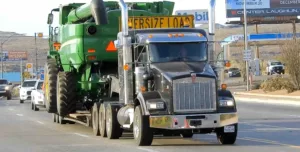
Shipping Over Dimensional Freight
Shipping Over Dimensional Freight Dedicated Transport Agent
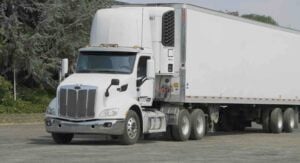
Unlock the power of dry van freight shipping, where efficiency meets reliability and your cargo arrives on time.
